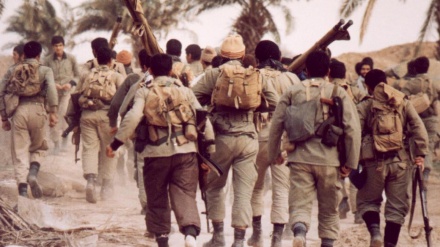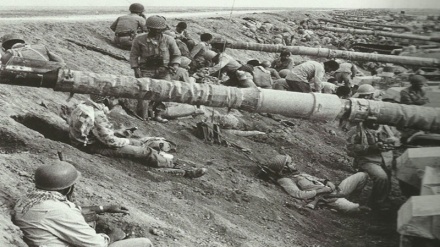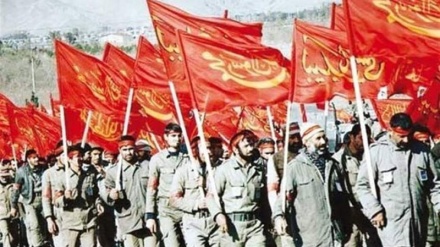Glimpses of Epic of 8-Year Holy Defense (61)
As a reminder, we discussed some of the developments after the great Kheibar Operation on the wetland. As we have mentioned several times, Kheibar was the first amphibious operation during the 8-year war.
Although all of the planned goals of the operation were not achieved, it was a precious experience for the Iranian forces and ushered in a new phase for countering the Ba'athist army. After Kheibar Operation, Saddam's masters and cohorts increased their support for him. The Saudi monarchy was one of the regimes that stood beside Saddam since the day he started the invasion of the Iranian soil. This regime in Riyadh extended broad support for Iraq and its propaganda machine was at the service of Saddam. The Saudi regime provided Saddam with military intelligence via the officers who had fled Iran after the ouster of the despotic regime of Shah. Saudi intelligence cooperation with Iraq was going on throughout the war.
One of the great economic contributions to Saddam was the Saudi agreement with exporting the Iraqi regime's oil through Arabia. Accordingly, in 1984, the Saudi regime allowed Iraq to export its oil through the port of Yanb'a on the Red Sea through the construction of an oil pipeline in Arabia. This was a big economic help to the Iraqi Ba'athist regime. Another political development after Kheibar operation was the bolstering of official ties between the US and the regime of Saddam. Former US president Richard Nixon, years after the Iraq-Iran war said, "The US strategy in the 1970s was to contain radical Iraq by relying on Iran, and in the 1980s, with the aim of containing the Islamic Revolution, relying on Iraq, designed the Iraqi war against Iran."
From 1972 till the middle of the Iraq-Iran war, the US had just an Interests Section with 14 diplomats in Baghdad. In November 1984, the US officially opened an embassy in the country. Thus after 17 years of weak diplomatic relations between the two countries, they began to re-establish political relations. In practice, after the victory of the Islamic Revolution in 1979, the US and Iraq already had political ties. A document of 1980 indicates that Saddam was instigated by the US to invade Iran. Jimmy Carter's national security advisor Zbigniew Brzezinski had met with Saddam two months before the invasion of Iran. Three months after the outbreak of the imposed war on Iran, the then Iraqi prime minister Tareq Aziz, in his visit to France talked to Figaro magazine about Brzezinski's meeting with Saddam on Jordanian border. The Iraqi prime minister said: The secret meeting between Brzezinski and Saddam was a green light to Iraq to attack Iran. Figaro wrote, "The war between Iraq and Iran actually began in June 1980 when Brzezinski visited Jordan and met Saddam on the border of Jordan with Iraq, and promised to fully support Saddam. He said that the US would not oppose Iraq's ambition for Arvand River and possibly the establishment of an Arabian Republic in this region."
Nonetheless, in its first reaction to the initiation of the Iraqi war against Iran, the United States issued a statement to express its "neutrality"! The neutrality was interpreted by US State Department spokesman as follows: "America's neutrality does not mean its indifference, and the US will use military force to secure the continuation of oil flow from external threats." Another example of the US role in provoking Saddam to invade Iran was delivering a report prepared by the CIA on Iran's social situation and the condition of its armed forces. The report was delivered to Saddam through Saudi regime in 1980. This issue was first raised in 1987 by the former US Ambassador to Riyadh and at the "Islamic Communities" Conference at Villanova University in Pennsylvania.
Robert Perry, American journalist in an article titled "The Green Light to Saddam" points out that in the main building of the US Congress, he has gained access to a "top secret" document. The document, quoting from General Alexander Haig, US Secretary of State in Reagan's administration, says that US President Jimmy Carter had given green light to the Saudi crown prince Fahd for Saddam's attack on Iran.
Another valid source regarding the US regime's support for the Iraqi invasion of Iran is the statement by an American official, Howard Tycher. He was once a member of the US National Security Council, and through this membership he had access to confidential and accurate information about US policies and programs regarding Iran and Iraq.
Regarding the US intelligence assistance to Iraq prior to the invasion of Iran, Howard Tycher said, "Financial aid, logistical support and security information were provided for Iraqis. They had the information that we had got from the assessment of Iran's military forces. I even believe that this information was influential in Saddam's decision to invade Iran."
The documents about the US role to incite Saddam are not limited to these. The diaries of a Ba'athist general further reveal this issue. Al-Samarrai, one of the Iraqi top brass in the days of Saddam, writes, "I do not think that the Americans, as much as they helped us, have helped any other country even [Zionist regime of] Israel!" The great Kheibar operation caused the US to further expose and escalate its support for the regime of Saddam. In late March 1984, US envoy Donald Rumsfeld headed for Baghdad to normalize US-Iraqi relations.
This visit caused a huge development in US support for Iraq during the war. The US by designing operation known as Staunch, tried to stop the transfer of weapons to Iran. After the victory of the Islamic Revolution and foundation of an Islamic government in Iran, the Great Satan had come to the conclusion that there was no choice for re-establishing relations with Iran. Accordingly, efforts increased for supporting Iraq against Iran. The Iraqi foreign minister Tareq Aziz in an interview said in Washington that restoring to political relations between the US and Iraq meant the change of Iraqi and American mentality and that the two countries were approaching each other. He said that if the US takes active and important measures in relation to its allies, this could help weaken Iran to continue the war. Also, US secretary of state George Schulz said: "We are neutral, but this neutrality does not mean we sit idle and wait for the end of the war."
FK/RM/ME


